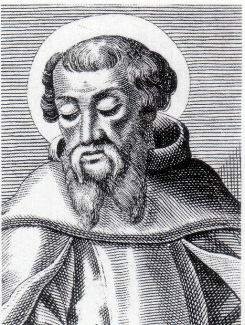
Today is the feast day of St. Irenaeus of Lyons (or Lugdunum, by its Roman name). Irenaeus was born in the first half of the second century, ca. A.D. 125, probably in Smyrna in Asia Minor. He was raised in a Christian home, and became a disciple of St. Polycarp, who had been a disciple of St. John the Apostle. After missionaries had begun to convert the Gauls of the West, Irenaeus journeyed to become a priest in Lugdunum, and later bishop. He suffered martyrdom at the beginning of the third century.
In his life, St. Irenaeus was an ardent opponent of Gnosticism, one of the earliest and most major Christian heresies, which was becoming rampant in his time. The Gnostics argued that they had received a secret oral tradition showing the way to Gnosis, hidden knowledge as a means to save the soul from the material world. It marked a blending of Christianity with elements of Hellenistic and Persian spirituality. Most of the so-called “lost books” of the New Testament were Gnostic texts rejected by the orthodox Church.
Irenaeus’s best known work, Adversus haereses or Against Heresies, written ca. 180, is a lengthy and detailed attack on Gnosticism and defense of the orthodox Christian faith. We find in it an important early witness to Christian orthodoxy: a statement of the core truths we hold central to the Christian faith today, intact and fully realized. Irenaeus argues strongly for the doctrine of apostolic succession: that the only way to ensure the orthodoxy, integrity, and fullness of the faith — to ensure that no heretical doctrines or corruptions crept in — is for Christian faith and teachings to be passed down through a known succession of bishops, whose line could be traced back to the Apostles themselves. The Gnostics had no such claim to apostolic authority, and by this he rejected their arguments.
Here I’ll quote a few important passages:
The Church, though dispersed through our the whole world, even to the ends of the earth, has received from the apostles and their disciples this faith: [She believes] in one God, the Father Almighty, Maker of heaven, and earth, and the sea, and all things that are in them; and in one Christ Jesus, the Son of God, who became incarnate for our salvation; and in the Holy Spirit, who proclaimed through the prophets the dispensations of God, and the advents, and the birth from a virgin, and the passion, and the resurrection from the dead, and the ascension into heaven in the flesh of the beloved Christ Jesus, our Lord, and His [future] manifestation from heaven in the glory of the Father to gather all things in one (Ephesians 1:10), and to raise up anew all flesh of the whole human race, in order that to Christ Jesus, our Lord, and God, and Saviour, and King, according to the will of the invisible Father, every knee should bow, of things in heaven, and things in earth, and things under the earth, and that every tongue should confess (Philippians 2:10-11) to Him, and that He should execute just judgment towards all . . . (Against Heresies I.10.1)
Irenaeus’s “rule of faith” bears many resemblances to the Apostles’ Creed, and is an early declaration of Christian orthodoxy.
As I have already observed, the Church, having received this preaching and this faith, although scattered throughout the whole world, yet, as if occupying but one house, carefully preserves it. She also believes these points [of doctrine] just as if she had but one soul, and one and the same heart, and she proclaims them, and teaches them, and hands them down, with perfect harmony, as if she possessed only one mouth. For, although the languages of the world are dissimilar, yet the import of the tradition is one and the same. . . (Against Heresies I.10.2).
He gives here a powerful statement of Christian unity: a unity which we should all strive for once again. One of the most important aspects of the Catholic Church to me is this same unity: how all throughout the world, no matter the language, the liturgy and the doctrine is the same: the same Christ and the same Church and the same Sacraments.
Here Irenaeus argues for the receipt of true knowledge and doctrine (as opposed to heretical doctrine) by means of the succession of bishops:
True knowledge is [that which consists in] the doctrine of the apostles, and the ancient constitution of the Church throughout all the world, and the distinctive manifestation of the body of Christ according to the successions of the bishops, by which they have handed down that Church which exists in every place, and has come even unto us, being guarded and preserved without any forging of Scriptures, by a very complete system of doctrine, and neither receiving addition nor [suffering] curtailment [in the truths which she believes]; and [it consists in] reading [the word of God] without falsification, and a lawful and diligent exposition in harmony with the Scriptures, both without danger and without blasphemy; and [above all, it consists in] the pre-eminent gift of love (2 Corinthians 8:1; 1 Corinthians 13), which is more precious than knowledge, more glorious than prophecy, and which excels all the other gifts [of God] (Against Heresies IV.33.8).
Leave a comment